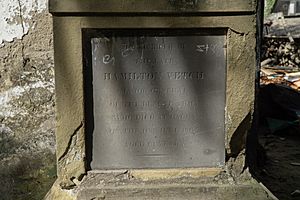Hamilton Vetch facts for kids
Hamilton Vetch (1804–1865) was a British army officer who served in the Bengal Army of the East India Company. He became a major-general and worked as a political agent in Upper Assam, which means he helped manage the area for the British. His family name was sometimes spelled Veitch.
Contents
Early Military Life
Hamilton Vetch was born in Haddington, Scotland. In 1822, he joined the East India Company as a cadet, training to become an officer. By 1823, he was an ensign (a junior officer) at Fort William in India, serving with the 23rd Regiment of Native Infantry.
He fought in the First Anglo-Burmese War, which was a big conflict in the region. After this, he was promoted to lieutenant in 1825. His regiment was then renamed the 54th.
Fighting in Assam
Vetch later took part in the Anglo-Khasi War from 1829 to 1833. He worked under David Scott and helped take control of Nongkhlaw in the western Khasi Hills. During this time, he led the 43rd Assam Light Infantry, destroying villages in the process.
In 1836, Vetch joined the Assam Sebundy Corps. He fought against the Bhutia people over an area called the dooars. He even captured a flag from a local leader at Soobung Kottah. He was promoted to captain in 1838, and this rank was made permanent in 1842.
Political Role in Assam
In 1839, Vetch officially took control of the Matak rajya area. By 1841, he was a Principal Assistant and a political agent for eastern Assam, working with the 54th Bengal Native Infantry. He moved to Dibrugarh in late 1842, a place he had chosen for a military base a few years earlier.
Vetch also made groups of Khamti people and Singpho people move to new lands. This was part of a British plan to resettle hill communities further east. In 1846, Vetch and other officers explored an old hill fort called Bhismaknagar.
In 1848, Vetch led a campaign in the Abor Hills against the Adi people (who were then called Abors). He had tried to negotiate with local leaders about gold washing in the area. However, when some Bodo–Kachari people involved in gold washing were held captive, Vetch led an expedition to free them. He was attacked, and in return, he burned an Adi village.
Assam's Economy
Hamilton Vetch was very interested in the economic potential of the Brahmaputra Valley in Assam, along with Commissioner Francis Jenkins. They knew the area had coal and gold, and they wanted to improve roads and communication. In 1842, Vetch became a member of the Agricultural and Horticultural Society of India.
In 1851, Vetch wrote about the challenges people faced when trying to find gold in the Dibang River. He also wanted to see more tea grown in Assam and for opium to be taxed.
In 1853, Vetch, who was then a major and Assam's deputy commissioner, helped write a report on Assam for the Marquess of Dalhousie. He liked the idea of replacing the old paik system (a labor system) with a new system where people could rent land. He strongly supported investing in tea farming. His report, published in 1854, included details about Assam's tax system.
In 1859, Vetch, now a lieutenant-colonel, spoke to a committee in the House of Lords about Assam's economy.
Later Life
Vetch left Assam in 1857 because he was ill with dysentery. He was promoted to major-general in 1862.
Hamilton Vetch passed away in Dacca on June 11, 1865. He left his properties in Bengal to his three children: Hamilton, Robert, and Agnes.
Family Life
In 1842, Hamilton Vetch married Louisa Colebrooke Campbell, who died in 1852. She was the daughter of Colin Campbell, a surgeon-general in Bengal.
Their daughter Agnes (born 1845) married Wladislaw Ścibor-Rylski in 1870. Their daughter, Rosalie Ścibor-Rylska, later had a daughter named Louise with Paul Claudel. Rosalie then married Francis Vetch, who was a distant cousin.
Hamilton and Louisa also had two sons: Hamilton the younger (born 1848) and Robert Francis. Robert Francis Vetch married Eliza Allen Harding in 1870. He worked as a transport manager in Africa for the International Association of the Congo. He died in Lagos in 1887 at the age of 38.
 | Madam C. J. Walker |
 | Janet Emerson Bashen |
 | Annie Turnbo Malone |
 | Maggie L. Walker |


